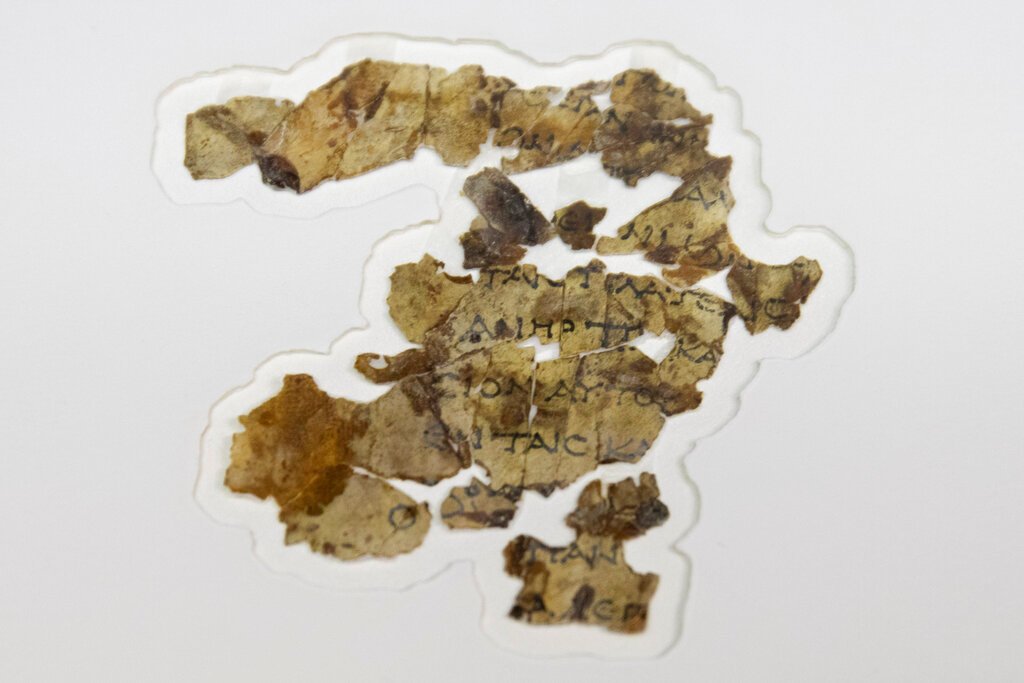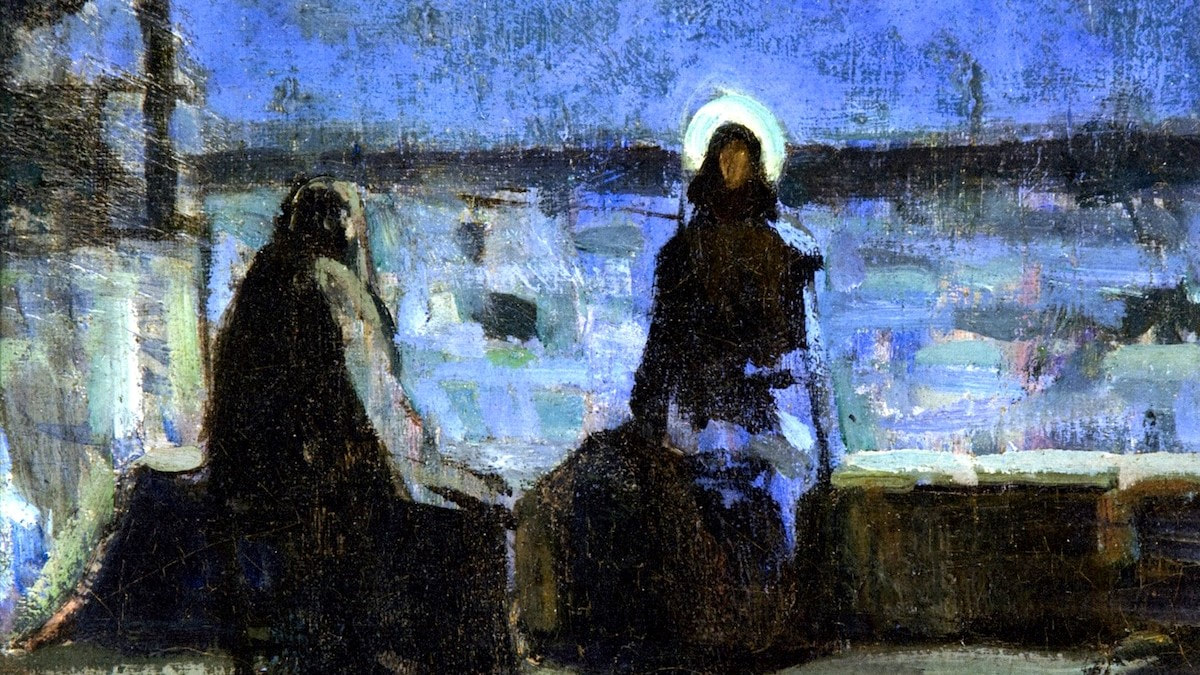Let Jesus Always SurpriseThroughout the year, the Southern New England Conference of the United Church of Christ reproduces the Daily Lectionary for use by churches. These are the suggested readings for Monday, March 22nd: Psalm 119:9-16; Isaiah 43:8-13; and 2 Corinthians 3:4-11. I would encourage you to read these short selections as part of your Lenten practice.
If I could convince anyone about anything about Jesus, it would be to let ourselves be surprised by Him. This puts Jesus in control rather than us putting Jesus in boxes of our construction. This allows for a lively faith to take hold of us so that we may become “ministers of a new covenant, not of letter but of spirit; for the letter kills, but the Spirit gives life. I trust that there are many paths to God. I trust this because I have had the pleasure of meeting so many good and decent people, inspiring people, who find God along those many paths. For me, my path is Jesus. I am thoroughly impressed by Christ, and continue to be surprised by Him. It amazes me to no end that Jesus empties Himself, as we will read on Palm Sunday, of His divine prerogatives and from birth to crucifixion Jesus is thoroughly human. The surprising truth of Jesus is that in Him God experiences unfiltered human life. God reveals Himself in the passionate relationship Jesus has with Abba, Father, but we are revealed to God in the sacred reality of Jesus’ human nature. Jesus is the uniquely personal connection between God and us. He is Son of God and Son of Man. His human nature must, therefore, be protected from the pious temptation to let the divine interrupt the human. For example, Mark, the oldest Gospel, tells the account of Jesus’ agony in the Garden of Gethsemane on the night before His crucifixion. This is a thoroughly human experience. Jesus prays to “Abba, Father,” but is not sure of a response. Jesus seeks support from His closest followers and is disappointed. Then, He is betrayed by one of His own, and all of this happens even before He is handed over to His enemies. The burden of this night is horrendous as any of us can imagine. Some ten or more years later, however, Luke or an anonymous editor is bothered by this commonness. 22:43-44 is not present in some of the ancient biblical sources. In the NRSV, therefore, these verses are printed within brackets. Luke or the editor add an angelic messenger into the account of Gethsemane. This may have comforted Luke or the editor, but it distorted the reality of Jesus’ human experience of those horrors. To pray to God as Father with a conditional sentence of “if” and to then be sent a strengthening angel steals away the genuineness and the meaningfulness of the experience. Jesus’ humanity must be protected from such pious intrusions. Jesus must be us. This is the ultimate purpose of His Incarnation and the cost of our salvation. We cannot stop at this point though. Jesus’ full humanity does not mean that Jesus is only fully human. His full divinity experiences His full humanity. God knows us and we know God in Christ. This is God not judging from afar, but encouraging us beside us, and “if there was glory in the ministry of condemnation, much more does the ministry of justification abound in glory!” Let Jesus surprise us in His full humanity and in His full divinity because what other reaction is possible when we consider that Jesus is our crucified God? If you’d like, here is the link to the Massachusetts Conference’s daily reading schedule: www.sneucc.org/lectionary.
0 Comments
A meandering path of faithThroughout the year, the Southern New England Conference of the United Church of Christ reproduces the Daily Lectionary for use by churches. These are the suggested readings for Saturday, March 20th: Psalm 51:1-12; Habakkuk 3:2-13; and John 12:1-11. I would encourage you to read these short selections as part of your Lenten practice.
Mention is made in today’s Gospel that Jesus had raised Lazarus from the dead. Jesus resuscitated Lazarus who was able to resume his natural, physical life. Jesus’ resurrection is fundamentally different than a return to His prior life as Jesus of Nazareth, but that is for another time. Today we hear that Jesus sits at table with this same Lazarus. The family of Mary, Martha and Lazarus appear to be quite close with Jesus. We hear uniquely in Luke’s Gospel (10:38-42) that Martha had grown impatient with her sister Mary because as she worked to prepare the meal, Mary sat as one of the disciples listening and learning at the feet of the teacher. Uniquely in John’s Gospel, we hear the story of raising Lazarus from the dead (11:1-44). The Lucan and Johannine story may share some even older shared tradition. If they do, Mary (who is not Mary Magdalene by the way) has a deeply spiritual connection with Jesus as indicated by her gender-inappropriate place among the male disciples in Luke, a place that Jesus insists will not be taken away from her. When her brother Lazarus dies, and Jesus had not rushed to his side (John 11:6), Mary seems offended and disabused. The sisters are told that Jesus has finally arrived. Martha rushes out to meet Him and gives testimony to one of the highest Christologies in the Gospels: “‘I believe that you are the Messiah, the Son of God, the one coming into the world,’” (John 11:27) but “Mary stayed at home.” (John 11:20) When Mary meets Jesus, she falls to His feet and with words that could be accusatory, she charges, “‘Lord, if you had been here, my brother would not have died.’” (John 11:32) Jesus sees her weeping and in the Bible’s shortest verse it is said, “Jesus wept,” (John 11:35) and Lazarus is called forth from his tomb. This is the same family we encounter in today’s Gospel. The same Mary who had grown skeptical of Jesus upon the death of Lazarus is now extravagant in her reception. The same Mary who doubted when her brother died is now acting to prepare Jesus for His coming death. Mary sees the sacredness of Jesus’ body while even among Jesus’ disciples there is blindness. Faith can be a meandering journey. Insight may arise from unexpected sources, and so may confusion. There can be tragic lows and extravagant highs. But through it all there is Christ. Let the church be a community of our shared experiences. Let us help one another to find our way. I invite you to worship with our community tomorrow. We will be joined by the Area Conference Minister, Rev. Terry Yasuko Ogawa, who will be preaching. Send me an email (randyc1897@gmail.com) and I will get you the log-in. If you’d like, here is the link to the Massachusetts Conference’s daily reading schedule: www.sneucc.org/lectionary . Our heavenly high priestThroughout the year, the Southern New England Conference of the United Church of Christ reproduces the Daily Lectionary for use by churches. These are the suggested readings for Friday, March 19th: Exodus 30:1-10; Psalm 51:1-12; and Hebrews 4:14—5:4. I would encourage you to read these short selections as part of your Lenten practice.
Today is our fifth Lenten Friday. Today we hear a concise and incisive biblical explanation of the cross. The sanctity of God’s presence within the Exodus tabernacle is symbolized by everything within the holy precincts being covered in pure gold. Within the tabernacle was the ark of the covenant and within the ark was the covenant itself – the stone tablets of the Ten Commandments. What we do not hear of as often is the “mercy-seat.” The mercy-seat rested atop the ark of the covenant. It served as the symbolic throne of God on earth. This is where God maintained His presence among the people of Israel: “In front of the curtain that is above the ark of the covenant, in front of the mercy-seat that is over the covenant, where I will meet you.” In order for the holiness of God to remain present among His people, God and their profaneness needed to be separated. Additionally, once a year Aaron the priest would perform “the rite of atonement on [the altar’s] horns.” This rite was fulfilled “with the blood of the atoning sin-offering. It is most holy to the Lord.” In the Jewish tradition, blood was equated with life, and all life belonged to God. Blood could only be shared with God. It was “most holy.” The blood, the life, of the sacrificed animal was offered as a substitute for the lives of God’s people. Their sins further separated them from God. Those sins needed to be atoned for if God were to remain upon the mercy-seat. And since sin was prevalent and recurring, the atonement sacrifice needed to be offered every year. The Epistle to the Hebrews plays a unique variation on this theme. Only here is Jesus presented as the Christian “high priest.” As a matter of fact, Jesus is the only Christian priest in the New Testament. The only other Christian priests are Jewish priests who accept Jesus, but they no longer serve their priestly function. (cf. Acts 6:7) Adding a bit of strangeness to this unique variation, Jesus, our heavenly high priest, makes an offering of Himself. Jesus is both the priest and the sacrifice. Now Jesus is unique in this role, but His incarnation, the human nature we all share with Jesus, imbues Him with empathy: “For we do not have a high priest who is unable to sympathize with our weaknesses, but we have one who in every respect has been tested as we are, yet without sin. Let us therefore approach the throne of grace with boldness, so that we may receive mercy and find grace to help in time of need.” Jesus need not offer annual sacrifices of atonement. His is the uniquely perfect sacrifice offered but once and it is from this one-time sacrifice that Jesus atones for us in heaven as our sympathetic high priest, sympathetic because Jesus brings into the very nature of God the personal experience of our weaknesses. Trusting in such sympathy, we approach the new mercy-seat with boldness knowing that Christ remembers our weaknesses. On this fifth Lenten Friday, let be bold and approach our Saviour, especially when it is necessary to “find grace to help in [our times] of need’ because Jesus lived, suffered and died so that we could approach Him boldly. The holiness of God no longer calls for separation. It calls us closer, to boldly go where no one dared go before. If you’d like, here is the link to the Massachusetts Conference’s daily reading schedule: www.sneucc.org/lectionary . The "living and active" Word of GodThroughout the year, the Southern New England Conference of the United Church of Christ reproduces the Daily Lectionary for use by churches. These are the suggested readings for Thursday, March 18th: Psalm 51:1-12; Isaiah 30:15-18; and Hebrews 4:1-13. I would encourage you to read these short selections as part of your Lenten practice.
A couple of days ago, Israel unveiled for public viewing a collection of newly discovered fragments found in caves scattered around the Dead Sea. They have named these as belonging to the famous Dead Sea Scrolls discovered in 1947. The fragments date to the time around Jesus of Nazareth and are the oldest copies of the biblical text ever found. Some of the fragments are but the tiniest scraps of text, but they are treated with the utmost respect: by some because of their antiquity and connection with ancient Israel, and by others because these are authentic connections with the inspired Word of God that “is living and active, sharper than any two-edged sword, piercing until it divides soul from spirit, joints from marrow; it is able to judge the thoughts and intentions of the heart.” It is absolutely essential to do everything possible to get as close to the original text as scholars are able. This is an aspect of what is called Form Criticism. Scholars work to recreate the original text hoping to discover the original context and thus the original meaning. This is part of exegesis. It is the scholarship that searches for what the text meant at the time it was written and within and on behalf of the community it was written for. Eisegesis, on the other hand, is the opposite of exegesis. It interprets the text not from the perspective of the author, but from that of the reader. By looking for the tiniest remnants of the oldest copies of the biblical literature, scholars seek to verify our current textual traditions or to amend them if needed. Once it is known what was said, then it is possible to interpret it as to what it is saying to us today. This is Hebrews’ “living and active” Word of God. The words convey the Word. The words should be as close to the original as possible so that the “living and active” Word may speak to us authentically. Scripture allows God the chance to speak to us and for this to happen we must read. We must listen for what the Word is saying. This respects the words of the tradition, but also allows the Word to continue to reveal and to speak to us as we are and where we are. Interpretation is what honours the Word as “living and active.” I hope that the Season of Lent gives us the inclination and the time to reach for the Bible, to read it thoughtfully, and to then spend time with it so that the words may become the unique Word for each reader at each particular moment of life. For as it was written so many centuries ago and yet still for us today: “The Lord waits to be gracious to you; therefore he will rise up to show mercy to you. For the Lord is a God of justice; blessed are all those who wait for him.” May Lent share with us the opportunity to wait for God. If you’d like, here is the link to the Massachusetts Conference’s daily reading schedule: www.sneucc.org/lectionary . "'I am the light of the world.'"Throughout the year, the Southern New England Conference of the United Church of Christ reproduces the Daily Lectionary for use by churches. These are the suggested readings for Wednesday, March 17th: Psalm 107:1-16; Isaiah 60:15-22; and John 8:12-20. I would encourage you to read these short selections as part of your Lenten practice.
In today’s Gospel selection, Jesus proclaims, “‘I am the light of the world.’” I think it’s interesting to note that we often contrast light and darkness. However, darkness has no real substance. It’s defined by what’s lacking. Darkness is where light is not. I create light by turning on a lamp. I don’t create darkness. I simply turn off the light and darkness returns. However, darkness is the baseline, not light. Darkness is there already, uncreated, in Genesis 1:2. Light shows up at the next verse as God’s first stated command. If we turn to the scientists, the creation of our universe began some 14 billion years ago with the Big Bang. The baseline void, the darkness was interrupted by light. And if we listen to the scientists, the universe in some unbelievably vast stretch of eons will fizzle out once again into utter, complete darkness, the last black hole will evaporate in a brief burst of light and then there will be nothing, absolutely nothing, absolutely nothing but darkness. When we use the imagery of light in religion, it need not be contrasted with deliberate evil. Maybe it can be set against the backdrop of nothingness, the abysmal baseline that is the constant, lurking alternative to light. When light fails, darkness does not win; darkness just waits for light to run out of energy. The spiritual lesson may be that righteousness, the light, is most threatened not be active darkness, sin, but by the passive inattention to keeping Jesus’ light close. In C.S. Lewis’ The Great Divorce, the sinners choose to venture farther and farther apart from each other until they can no longer be seen or see. They become the darkness because they have distanced themselves from Jesus’ light. Not many people identify as sinners and but a few are categorized as sinners, but how much easier it is to grow more and more casual in our faith lives, to let the light of Christ grow farther and farther away, and then darkness returns ever so casually. The baseline reasserts itself. Christ is an active choice to stand out in the darkness, to be the light. Christ is the light of the world. Darkness is the passive alternative. May our time in Lent help to energize our faith, to stand with the light of the world. If you’d like, here is the link to the Massachusetts Conference’s daily reading schedule: www.macucc.org/lectionary. A time of returnThroughout the year, the Southern New England Conference of the United Church of Christ reproduces the Daily Lectionary for use by churches. These are the suggested readings for Tuesday, March 16th: Numbers 20:1-13; Psalm 107:1-16; and 1 Corinthians 10:6-13. I would encourage you to read these short selections as part of your Lenten practice.
In the selection from Numbers, we hear a rather abrupt mention of Miriam’s death. This is strange except for the fact that Miriam is a woman. Other than this, Miriam was Moses and Aaron’s sister, a prophet and a leader of Israel. Her death, as pointed out by Rabbi Elan Babchuck at last weekend’s Super Saturday, may have disturbed Moses and Aaron more than the text implies. As yesterday’s reading attests, today’s depravation is not an unfamiliar occurrence. If waters could be miraculously turned potable, then waters could flow from a rock. And yet, the Bible says Moses struck the rock twice. This need not be a rapid succession of two hits. I imagine the scene as Moses striking the rock and expecting water to flow, but nothing happens. The crowd murmurs, Moses turns to his brother Aaron, both are anxious. With nothing happening, Moses strikes the rock a second time as if God may not have realized the first tap. After the second striking of the rock, the water flows and the people are satisfied – physically. However, the second striking of the rock betrayed a lack of trust on the part of Moses and Aaron before the congregation. They had doubted, and this failed to “show [God’s] holiness before the eyes of the Israelites.” For this offense, they were not permitted to lead Israel into the Promised Land. The rabbi linked this lack of trust with Miriam’s death. They seemed unable to grieve her passing, this pious leader of Israel, this prophet, this beloved sister of Moses and Aaron. Non-biblical tradition holds that it was Miriam who watched over him as he lay in a basket among the reeds of the Nile River. And yet she died and was buried in the wilderness, in a no-man’s land, in a place with no history or connection with her ancestors. She was buried a stranger. Moses and Aaron may have been more deeply hurt by this than the text allows. We should remember that according to the oldest Gospel, Mark’s, there is not a single follower who was beneath Jesus’ cross. Did the crucifixion cause them to lose trust? Mark and Matthew maintain the tradition that Jesus met with the disciples after the resurrection in Galilee. Why Galilee? Had they abandoned Jesus and disbanded themselves, and had they already returned to their prior lives in Galilee? Did they lose trust? It would be difficult to argue that the disciples were stalwart in their faith on Good Friday, but it is these same disciples who return to Jesus and begin the ministry and evangelism that led to Jesus’ name being known around the globe and worshipped by more people than any other religion. To lapse in trust is not the end of the story. Lent is a time to prepare for resurrection(s). Jesus rises from the dead and if we have had occasions where our trust has come up short, then Lent is a sacred time to resurrect our faith, to become reacquainted with a Saviour who loves us as much as the cross. Life is hard. Faith is sometimes hard. Trust can be lost. Quite extraordinary people lost their trust, but came back to do even more extraordinary things. I pray that this Lent may bring any who have had times of doubt back to faith. If you’d like, here is the link to the Massachusetts Conference’s daily reading schedule: www.macucc.org/lectionary. "Holy partners" in the work of ChristThroughout the year, the Southern New England Conference of the United Church of Christ reproduces the Daily Lectionary for use by churches. These are the suggested readings for Monday, March 15th: Exodus 15:22-27; Psalm 107:1-16; and Hebrews 3:1-6. I would encourage you to read these short selections as part of your Lenten practice.
This past weekend I attended the online Super Saturday event sponsored by the Southern New England Conference, United Church of Christ. The keynote speaker was Rabbi Elan Babchuck. Rabbi Babchuck offered the homily during the morning’s worship Service. He drew upon a similar instance in Israel’s Exodus journey from Egyptian slavery to the Promise Land as the one shared in today’s Lectionary. He highlighted the nostalgia that pervaded the thoughts of the once enslaved Hebrews. As things grew precarious at different times during the Exodus, the people would complain that Moses had taken them out into the wilderness to die, that life was better under Egyptian slavery. They had lived as slaves, yet nostalgia somehow romanticized even that past. The rabbi’s emphasis was that Israel needed to learn to trust more resolutely in God, that God had not taken His people out into the wilderness to let them die, that God was leading them to their Promised Land. They needed to trust in where they were going, in other words, not where they had been. The Jewish people were compelled to wander in the wilderness for 40 years until the first generation had all died. God had led them to the border of the Promised Land, but the people did not trust in God enough to enter. God ordained at that moment that no adult among them would be allowed to enter the Promised Land. The privilege of crossing the border would be given to their children. The generation formed in slavery was too locked into the strictures of the slave mentality. Hope was suppressed forcibly and meager subsistence filled the void where possibility should have lived. It would need to be the children born in the freedom of the Exodus wilderness who could appreciate the potential of liberty, who could reach beyond the nostalgia of the past and work toward the future. The first followers of Jesus had to be of the same ilk. They needed to be free enough, as mentioned by the author of Hebrews, to be “brothers and sisters, holy partners in a heavenly calling.” They could not only approach the faith expecting everything to be provided, and when it was not to then simply complain like the first generation in the Exodus. Christians would be called upon to become “holy partners in a heavenly calling.” They would be expected to become co-workers with Jesus in building a better world. This would be their spiritual liberation, their faith’s maturity. This calling to be “holy partners in a heavenly calling” is what opens the Promised Land to us. Lent is most definitely a time of spiritual introspection, but it is also a time to reaffirm our commitment to follow Christ in how we live, in what we do, or as Hebrews would say, as we become “brothers and sister, holy partners in a heavenly calling.” Our faith in Jesus calls upon us to trust enough in God so that we can hope enough so that we can build a better tomorrow. If you’d like, here is the link to the Massachusetts Conference’s daily reading schedule: www.macucc.org/lectionary. Nicodemus' exampleThroughout the year, the Southern New England Conference of the United Church of Christ reproduces the Daily Lectionary for use by churches. These are the suggested readings for Saturday, March 13th: Numbers 20:22-29; Psalm 107:1-3, 17-22; and John 3:1-13. I would encourage you to read these short selections as part of your Lenten practice.
Nicodemus is an enigma. He is hard to classify. Was he a believer in Jesus or one who could not quite commit? Outside of the Bible, there is equally confusing testimony. The Jewish Talmud may mention Nicodemus as a disciple of Jesus. Other than this, the Jewish sources remain silent as to a teacher by this name, at this time. An argument in the negative like this is not the most convincing. However, if the two are combined, the possible Jewish-source listing of a Nicodemus as a disciple of Jesus and the absence of other mentions of a reportedly well-known teacher such as Nicodemus in the Jewish literature, there is the possibility that Nicodemus did come to believe. Ancient rabbinic practice was to never mention the name of an apostate, and if Nicodemus did become a follower of Jesus, this would explain much. But in John 3, we encounter a puzzled teacher. Nicodemus is drawn to Jesus, but is reluctant because Jesus is not what had been expected by the religious leaders. There’s a spiritual connection between Jesus and Nicodemus, but the intellectual is erecting barriers. This is why Jesus warns Nicodemus, “‘Very truly, I tell you, no one can see the kingdom of God without being born from above.’” In other words, you must let the Spirit lead. God is not bound by human interpretations and expectations. God will surprise, and we must remember this because it is a constant. We will speak more of God’s surprises tomorrow at our worship Service. We will be directed to read the famous passage: “‘For God so loved the world that he gave his Son.’” If this does not surprise, then we haven’t thought about it enough. We all face the dilemma of Nicodemus. Do we come at God with our expectations in the lead or will we allow ourselves to be surprised by God? I’ve seen many a bumper sticker that reads: God is my co-pilot. The Nicodemus pericope asks us to trust enough in the promptings of the Spirit that we allow God to be not the co-pilot, but the pilot. If you would like to join us tomorrow at worship, please know that you are more than welcome, and this invitation goes out especially to the seekers, the ones in Nicodemus’ shoes, the ones trying to figure out Jesus. You are more than welcome to come and join other believers and seekers as part of the community of our congregation. If you’d like, I can send you the login for Sunday’s Service. Please send me an email at randyc1897@gmail.com. If you’d like, here is the link to the Massachusetts Conference’s daily reading schedule: www.macucc.org/lectionary. |
NewsFaith, love and chitchat. Categories
All
Archives
February 2024
Follow
|
|
SERVICE TIMES
Sunday 9:30-10:30am Children Sunday School 9:30-10:30am Nursery care available during worship DONATE Make a single or recurring contribution by clicking here |
FOLLOW
|








 RSS Feed
RSS Feed
